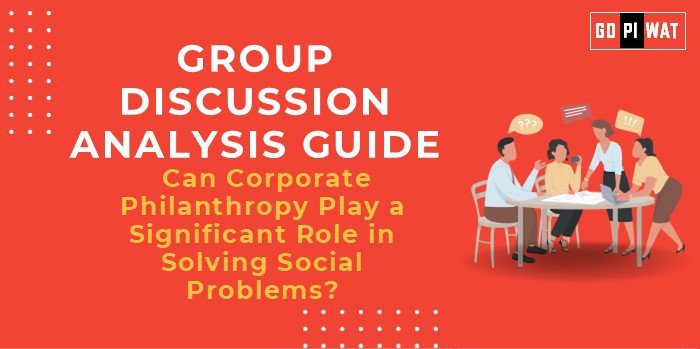📋 Group Discussion (GD) Analysis Guide
🌐 Can Corporate Philanthropy Play a Significant Role in Solving Social Problems?
✨ Introduction to Corporate Philanthropy
Opening Context: In an era of global inequality and pressing social issues, corporations are increasingly expected to move beyond profit-making and play a pivotal role in addressing societal challenges through philanthropy.
Topic Background: Corporate philanthropy involves businesses voluntarily allocating resources—financial, human, or intellectual—to causes that solve social problems like poverty, education, and health. Globally, companies such as Google, Microsoft, and Tata Group have invested significantly in social initiatives.
📊 Quick Facts and Key Statistics
- 🌍 Global Corporate Donations: $29 billion donated by Fortune 500 companies in 2023.
- 🇮🇳 India CSR Contributions: ₹25,715 crore spent under CSR in FY 2022-23 (MCA Report).
- 📚 Education Sector: 40% of CSR funds in India are directed toward education programs.
- 💡 Impact of Philanthropy: Tata Trusts uplifted over 10 million people through health and education projects.
👥 Stakeholders and Their Roles
- Corporates: Provide funding, technology, and expertise for social initiatives.
- NGOs: Facilitate implementation of projects in underserved areas.
- Governments: Develop policies that encourage corporate responsibility.
- Communities: Serve as beneficiaries and collaborate with organizations for sustainable impact.
✔️ Achievements and Challenges
🏆 Achievements
- Education Development: Infosys Foundation supports rural schools, enhancing literacy rates.
- Healthcare Access: Microsoft’s AI for Health program improves medical services worldwide.
- Environmental Sustainability: Reliance Industries’ CSR focuses on afforestation and clean energy initiatives.
⚠️ Challenges
- Superficial Efforts: Some companies indulge in “greenwashing” without genuine social impact.
- Inequality in Funding: Urban regions often benefit more than rural areas.
- Measurement Issues: Lack of transparent metrics to evaluate CSR effectiveness.
🌍 Global Comparisons
- USA: Philanthropic giving is a cultural norm, led by foundations like the Bill & Melinda Gates Foundation.
- Europe: Focus on sustainability-driven initiatives under ESG (Environmental, Social, Governance).
📜 Structured Arguments for Discussion
- Supporting Stance: “Corporate philanthropy has transformed lives. Tata Trusts’ work in India’s education sector proves that targeted efforts can achieve measurable social outcomes.”
- Opposing Stance: “Philanthropy often serves as a PR tool, enabling corporations to avoid accountability for environmental or labor issues.”
- Balanced Perspective: “While corporate philanthropy can address gaps in social welfare, it should complement—not replace—government policies for systemic change.”
📈 Effective Discussion Approaches
-
Opening Approaches:
- “In 2023, Indian corporates spent ₹25,000+ crore on CSR—proving businesses’ growing role in tackling social issues.”
- “While philanthropy bridges gaps in education and healthcare, it raises questions about the sincerity and sustainability of corporate efforts.”
-
Counter-Argument Handling:
- “While some claim philanthropy is a PR exercise, companies like Microsoft and Tata Group have measurable results, ensuring accountability.”
- “A sustainable model of corporate philanthropy involves partnerships with governments and NGOs for long-term impact.”
🔍 Strategic Analysis of Strengths and Weaknesses
- Strengths: Access to financial resources; global expertise and innovation.
- Weaknesses: Lack of transparency and measurable impact.
- Opportunities: Public-private partnerships for sustainable development.
- Threats: Dependency on corporate funding for essential services.
🎓 Connecting with B-School Applications
- Real-World Applications: Projects on CSR initiatives and their economic impact; internships with CSR wings of major corporations.
-
Sample Interview Questions:
- “How can corporate philanthropy drive inclusive growth in India?”
- “What steps can companies take to ensure their philanthropy has a lasting impact?”
- Insights for B-School Students: Develop a CSR-centric business model for long-term brand equity; explore case studies of companies balancing profit and purpose.


